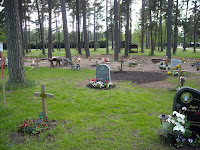 2010 is coming to an end and it is only fitting to think of how fast the year went with things and events that filled the hours, days, weeks and months of the year soon bygone. It has been a year of life-changing decisions after reaching a stage where one enjoys the freedom to enter an arena of choices and non-choices.
2010 is coming to an end and it is only fitting to think of how fast the year went with things and events that filled the hours, days, weeks and months of the year soon bygone. It has been a year of life-changing decisions after reaching a stage where one enjoys the freedom to enter an arena of choices and non-choices. The start of 2010 for me was momentous when an opportunity for a last minute travel to some island in the Atlantic presented itself with the first snow blizzard that ushered in a long hard winter in Sweden. That was the beginning of many new things that followed later. The most important, was the beguiling chance of a new lifestyle somewhere that extended in space beyond some seas and oceans.
In January last year, we (my life companion and I) discovered Cape Verde by accident - a third choice after rejecting the first two places also known for sunshine and exotic beauty. Some say that divine intervention or accidental fates can come with unentended consequences that bring great surprises. Just when life's worth appeared to have reached its peak of diminishing return, so comes an invitation for new challenges. Not exactly challenges that impose itself like an ultimatum, but one that comes with the allure of a temptress.
When we discovered Cape Verde, we saw the possibility to re-arrange our lifestyle and enjoy the freedom to be where our hearts take us. Sweden is beautiful to experience the four seasons, to watch the eternal cycle of birth, death and rebirth of nature's living landscape. But winters despite its pristine beauty is not for all ages. It forces many less sporty souls to a life of indoor seclusion. One does not have to accept such an imposition if there's a way out of it.
There are places of more agreeable weather that guarantee a lifestyle of active interaction with mankind and nature. The tropics is nothing new to me. I am of the tropics and I have lived near two great oceans - the Pacific and Indian. To sail the Atlantic ocean recently simply completed my acquaintance with the three great oceans of the world.
After making a decision to a split residence between Stockholm - during its best months from May to October and Cape Verde- during the winter months from November to April, we found ourselves owning a piece of seaside property in Sal island, in Cape Verde. Having a dual residence became a real possibility. It is not unique as many already enjoy a similar arrangement of living in two places where they enjoy a better quality of life. I am from the tropics and I have experienced life where both land and sea are accessible without spending too much flight hours. But to continue a new life in a new place is more interesting because I have already unburdened myself of the many baggages of the past. The land of my birth where the bones of my loved ones rest has become unlovable. I need a new place to nourish my heart and allow my mind to remain active and questioning.
In 2010 I said goodbye to a job I was fairly content with. But I didn't like the petty bureaucracy of the workplace. I don't like dealing with a bunch of mediocres. I welcomed the freedom to choose what I want to do, not because I have to but because I would like to. I also said goodbye to my house where once there was love and family, but they no longer resided in what was once a home. I tore myself away from many distilled memories of the past kept in boxes but I took the best ones and kept them in my heart.
I am open to new surprises that come with the change of lifestyles, in particular the sudden possibility of owning a yacht and sailing the Atlantic from Las Palmas to Cape Verde. I have always had images of glamour and adventure attached to sailing. It was indeed the biggest adventure of my life. Everything else I did in the past as a journalist covering insurgency and separatist wars or doing peace and conflict research in war-torn Bosnia are pale by comparison. If I survived a difficult sailing in a tempestuous ocean then I believe that I just earned the right to a few more years of adventure, but I will choose the waters to cross.
I can say that the year 2010 has been a good one. It showed me that choices in life have no limits except those imposed on oneself. The ability to change no matter how uprooting the feeling that comes with changing entitles one to the joys of self triumph over achievements made, big and small. It is the defining moment of true character.
I welcome 2011 with as much vigour and anticipation for new things to keep heart and mind in balance. The outside world is facing the perils of extremism, but in my world - if I have the choice, I would like to moderate time's speed so that I can savour the coming and passing of more years and the many moments that make my life complete and happy.#






















